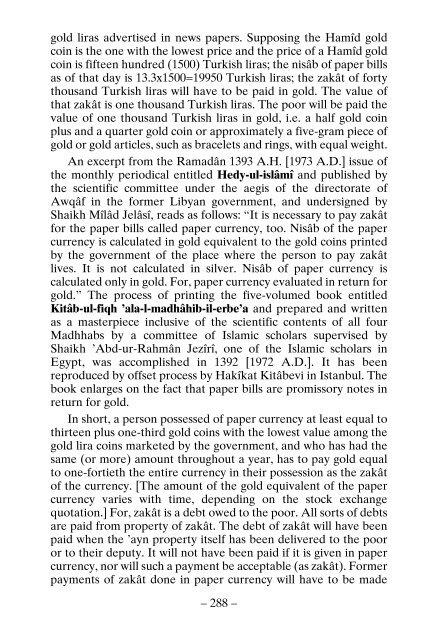O Son !
THE BOOK ‘O SON’ Al-hamdu lillâhi Rabbil ’âlamîn. Wa-s-salâtu wa-s-salâmu ’alâ Rasûlinâ Muhammadin wa Âlihi wa Sahbihi ajma’în. 1– O son! Collecting from books written by the scholars of the Hanafî Madhhab three hundred and sixty hadîth-i-sherîfs and forty-four khabars and also the seven essentials and the five rukns and the seven wâjibs and the fourteen sunnats and the twenty-five mustahabs and the fourteen mufsids of namâz, I have explained them for you. Adapt your acts and deeds to these teachings so that you attain fayz and nejât (salvation)! 2– Also for your information, I have collected a thousand and ninety âdâb (adabs) for you and for other young Muslims like you. If you adapt your actions and acts of worship to these teachings, they will be sufficient for you. If you laze, disobey Allâhu ta’âlâ and cease from these practices and manners, you will be afflicted with slavery and disgrace in the world and subjected to torment in the world to come. If you live up to them and advise your Muslim brothers to do the same, it will be useful for you. They will say blessings over you. And Haqq ta’âlâ will accept their invocations. For, a slave will be pardoned on account of another slave’s invocations for them.
THE BOOK ‘O SON’
Al-hamdu lillâhi Rabbil ’âlamîn. Wa-s-salâtu wa-s-salâmu ’alâ
Rasûlinâ Muhammadin wa Âlihi wa Sahbihi ajma’în.
1– O son! Collecting from books written by the scholars of the
Hanafî Madhhab three hundred and sixty hadîth-i-sherîfs and
forty-four khabars and also the seven essentials and the five rukns
and the seven wâjibs and the fourteen sunnats and the twenty-five
mustahabs and the fourteen mufsids of namâz, I have explained
them for you. Adapt your acts and deeds to these teachings so that
you attain fayz and nejât (salvation)!
2– Also for your information, I have collected a thousand and
ninety âdâb (adabs) for you and for other young Muslims like you.
If you adapt your actions and acts of worship to these teachings,
they will be sufficient for you. If you laze, disobey Allâhu ta’âlâ
and cease from these practices and manners, you will be afflicted
with slavery and disgrace in the world and subjected to torment in
the world to come.
If you live up to them and advise your Muslim brothers to do
the same, it will be useful for you. They will say blessings over you.
And Haqq ta’âlâ will accept their invocations. For, a slave will be
pardoned on account of another slave’s invocations for them.
Create successful ePaper yourself
Turn your PDF publications into a flip-book with our unique Google optimized e-Paper software.
gold liras advertised in news papers. Supposing the Hamîd gold<br />
coin is the one with the lowest price and the price of a Hamîd gold<br />
coin is fifteen hundred (1500) Turkish liras; the nisâb of paper bills<br />
as of that day is 13.3x1500=19950 Turkish liras; the zakât of forty<br />
thousand Turkish liras will have to be paid in gold. The value of<br />
that zakât is one thousand Turkish liras. The poor will be paid the<br />
value of one thousand Turkish liras in gold, i.e. a half gold coin<br />
plus and a quarter gold coin or approximately a five-gram piece of<br />
gold or gold articles, such as bracelets and rings, with equal weight.<br />
An excerpt from the Ramadân 1393 A.H. [1973 A.D.] issue of<br />
the monthly periodical entitled Hedy-ul-islâmî and published by<br />
the scientific committee under the aegis of the directorate of<br />
Awqâf in the former Libyan government, and undersigned by<br />
Shaikh Mîlâd Jelâsî, reads as follows: “It is necessary to pay zakât<br />
for the paper bills called paper currency, too. Nisâb of the paper<br />
currency is calculated in gold equivalent to the gold coins printed<br />
by the government of the place where the person to pay zakât<br />
lives. It is not calculated in silver. Nisâb of paper currency is<br />
calculated only in gold. For, paper currency evaluated in return for<br />
gold.” The process of printing the five-volumed book entitled<br />
Kitâb-ul-fiqh ’ala-l-madhâhib-il-erbe’a and prepared and written<br />
as a masterpiece inclusive of the scientific contents of all four<br />
Madhhabs by a committee of Islamic scholars supervised by<br />
Shaikh ’Abd-ur-Rahmân Jezîrî, one of the Islamic scholars in<br />
Egypt, was accomplished in 1392 [1972 A.D.]. It has been<br />
reproduced by offset process by Hakîkat Kitâbevi in Istanbul. The<br />
book enlarges on the fact that paper bills are promissory notes in<br />
return for gold.<br />
In short, a person possessed of paper currency at least equal to<br />
thirteen plus one-third gold coins with the lowest value among the<br />
gold lira coins marketed by the government, and who has had the<br />
same (or more) amount throughout a year, has to pay gold equal<br />
to one-fortieth the entire currency in their possession as the zakât<br />
of the currency. [The amount of the gold equivalent of the paper<br />
currency varies with time, depending on the stock exchange<br />
quotation.] For, zakât is a debt owed to the poor. All sorts of debts<br />
are paid from property of zakât. The debt of zakât will have been<br />
paid when the ’ayn property itself has been delivered to the poor<br />
or to their deputy. It will not have been paid if it is given in paper<br />
currency, nor will such a payment be acceptable (as zakât). Former<br />
payments of zakât done in paper currency will have to be made<br />
– 288 –

















